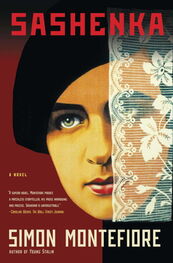I SMELLED THE village before I saw it. After the long fast, I was weak as any invalid. I struggled the last half mile, stopping every other minute to corral my last reserves of strength. The snow had hardened a bit with the wind, but was still incredibly deep, and often I’d had to strike out cross-country across fields where fallen trees barred the road. Finally I smelled chimney smoke—welcome as a brass band. People cooking, bread baking. Salvation. A dog barked. Peasants called to one another in the fog, exchanging thoughts about the storm as they dug out narrow walkways between snowbound izbas and the lane.
A sledge passed, loaded with hay. I trembled, leaning into a tree and fighting for consciousness, thinking of the girl I’d once been, waiting just here that evening after my long walk from Tikhvin. How strong I’d been then, how confident of my powers compared to this scarecrow, this ghost I’d become.
A burly man in a greasy coat and leather apron came out of the forge with another man. Together they stood smoking on the porch, shook hands and parted. Soon the clang of the blacksmith’s hammer filled the morning. So much activity! In my half-starved, unreal state, this tiny village was dizzying as Petrograd.
Finally a brisk young woman appeared on the porch of a prosperous izba with four windows past the blacksmith’s shop. She was eating an apple. I left the safety of the trees to approach her. It had been so long since I’d spoken to anyone not Ionian. She raised her head, squinting at me. I could only imagine what I looked like these days in my homemade fox hat and sheepskin and felt boots, my game bag, my patchwork sarafan with the trousers underneath, my face wrapped in a thick woolen scarf. I lowered the scarf.
I don’t know what I expected. A smile, an embrace? At least the welcome I’d received the last time I was here. But it wasn’t forthcoming. Her mouth gaped open in shock. Was I so changed? “What are you doing here? Are you crazy?” She lowered her head, her back half turned, checking up and down the lane. She tossed the apple, half-eaten, picked up a broom and swept the steps. “You’ve got to get out of here,” she hissed. “Don’t you know what’s going on? I can’t be seen with you. You’ve got to leave.”
But I was too weak to leave. I needed to eat, to rest, to collect myself and make plans. “I can’t go any farther. I’m pregnant. I need food. They’re starving out there at Maryino.”
“Well, what am I supposed to do about it?” She swept angrily. “They should have thought about that when they moved out there. We have our own problems now.” A cluster of peasant women were watching us from the porch of another house. “Damn those busybodies,” she said under her breath. “Now you’ve done it. Sveta!” she exclaimed, leaning her broom against the house. “Good to see you! Mama’s going to be so happy!” She pulled me in for an embrace. In my ear, she whispered, “Go to Olya’s. Two houses from the end. And don’t come back. I can’t do anything for you.”
“Thanks.” The smell of her apple followed me like a perfume as I headed down the lane. To think I’d taught Lyuda how to read. We’d swum in the river together, climbed trees, picked berries. But the revolution was still going on, and people had changed. I was the one who had to keep up. I walked down the lane, trying not to gape like a rube on Nevsky Prospect. But the colors were dazzling. I’d been locked away in another world. Here were children and horses and old people, but there were hidden worlds, too. I had to be the hunter, not blunder in, keep my wits about me. Lyuda’s fear had been palpable. Why? Had there been an expropriation? Had the Cheka arrived? Something had changed since I’d been out at Maryino if she was afraid to even talk to me now.
So I was to be Sveta, some cousin or other, visiting Auntie Olya.
Avdokia’s half sister’s house was small, sad, with an old coating of blue paint worn mostly to the boards. The path had barely been cut—it looked stamped, not shoveled. Some neighbor had broken her out, but that was all. What had been a front porch was only a tunnel, the roof heavily laden. I took off my snowshoes and propped them by the door. It was private here at least, down the end of the lane, away from the village center. I was about to knock on Olya’s door, then thought better of it. If I were truly some distant cousin, I wouldn’t be standing on the front porch like a census taker.
It was warm inside and shockingly crowded. Little tables, pieces of lace, rugs, even an ugly chandelier with a milk-glass bowl crammed the small cabin to the rafters, all bits and pieces of our bourgeois life at Maryino. On the tables stood portraits of my family in silver frames. It was a museum of a former life, a former world. I could not even be angry at her. They were only things, and things had no feelings. What would I do with them, anyway—sell them? If anyone deserved the booty, it was Olya, who had washed and dusted and polished them all these years. And yet I couldn’t deny a small sense of betrayal.
“Olya?”
The place was damp with steam, and a great pot boiled on the stove. “Olga Fomanovna?” I called from the doorway. I’d never used her patronymic. No one ever had, not in my hearing.
She looked up from a load of laundry she was ironing, a sheet on the board. She reminded me of a bigger, softer Avdokia, twenty years younger. Same father, different mother. Women wore out quickly in the villages. Her mouth made a perfect O.
“Sorry to barge in. Lyuda said you’d be here.”
“Marina Dmitrievna! No, no, please, come in, come in!” She looked around the place, suddenly aware that I was seeing the extent of her plunder, and her hands flew to her mouth. The sheet started to burn. She put her iron upright just in time.
“It’s been a while,” I said.
“You’ve seen Lyuda, then?”
I nodded. “She didn’t want to be seen with me, though. Class enemy and all.” I took off my hat.
“Oh, don’t mind her.” Olya came away from the laundry, took my hat and bag, helped me off with my coat, hung it on the hook by the door. “Now that she’s on the village committee she thinks she’s Lenin’s right arm.” She nodded approvingly. “Married the blacksmith after all. That girl always had an eye to improving her lot. I told her the blacksmith would be good for her, didn’t I? She runs him like a horse around a ring.” The words poured out of her, probably in an attempt to distract me from the familial furniture and bric-a-brac. “Remember when she wanted to go to Petrograd and work in a factory? She certainly came to her senses. Sit down, sit down!” She pulled out a chair from the lace-covered table.
I recognized the chair, too. It was one that used to sit at the little desk in the front parlor where my mother opened the mail. Somehow the sight of that chair loosened the grief of having lost her. I settled down into it. Now I was glad to let Olya babble away.
“We don’t get many visitors, as you can imagine. Can I make you some tea? Let me heat the samovar. Did she tell you she had a letter in the paper, my Lyuda? Imagine! Look, there on the table.” She handed me a yellowed issue of Bednota, a badly printed newspaper intended for peasant consumption, folded back to a page of letters and reports from the villages. A complaint about a certain corrupt party official in Ryazan Oblast headed the page.
“Look—right there.” Flushing with pride, she pointed to a report below the Ryazan one. From “Correspondent L. G. Fedeyeva.” Lyuda, writing for Bednota. She described the cooperation of the Novinka Village Committee of Poor Peasants with a Red Army food detachment to expropriate the hoarded goods of the kulak Zuborin. How many poods of grain they had located under the floor of his barn and so on. It ended, “The Speculators and Kulaks might think they’ve put One over on Soviet Power but they will not Succeed because we Know Them.”
Читать дальше








